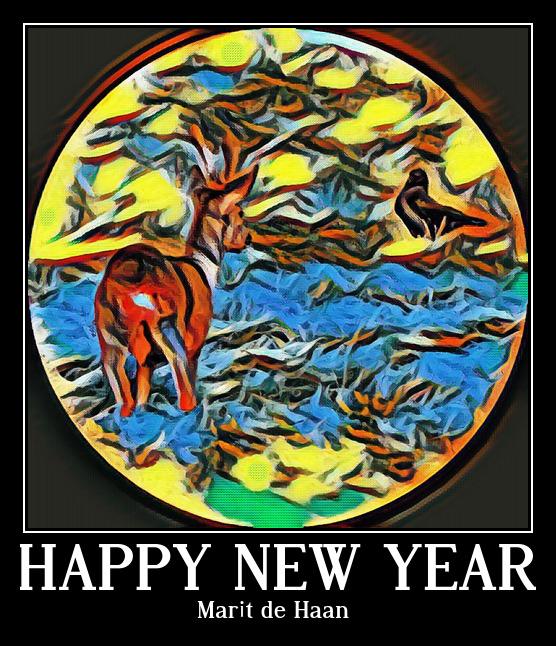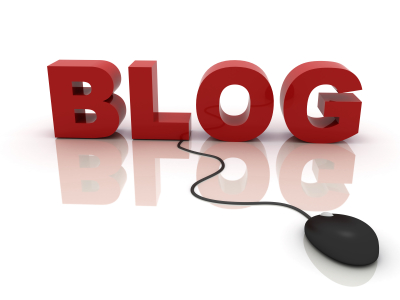
Our Blog Page 5 (2022)
For our previous blogs please click on the buttons below
France , 8 July 2022
Demonstration against hunting in La Rochelle and after that a short visit to the two bulls we are fostering of association LUNA in the Vendée
Today we joined a demonstration against hunting organised by One Voice in La Rochelle. We were dressed up as a dinosaur and a rabbit drawing quite some attention to kids and dogs ;-) .
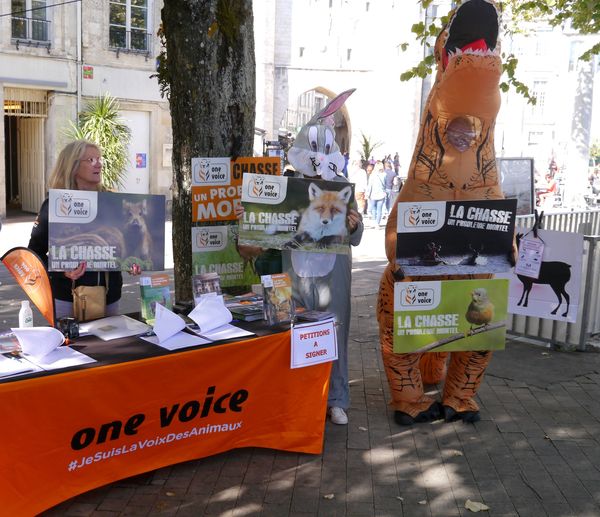
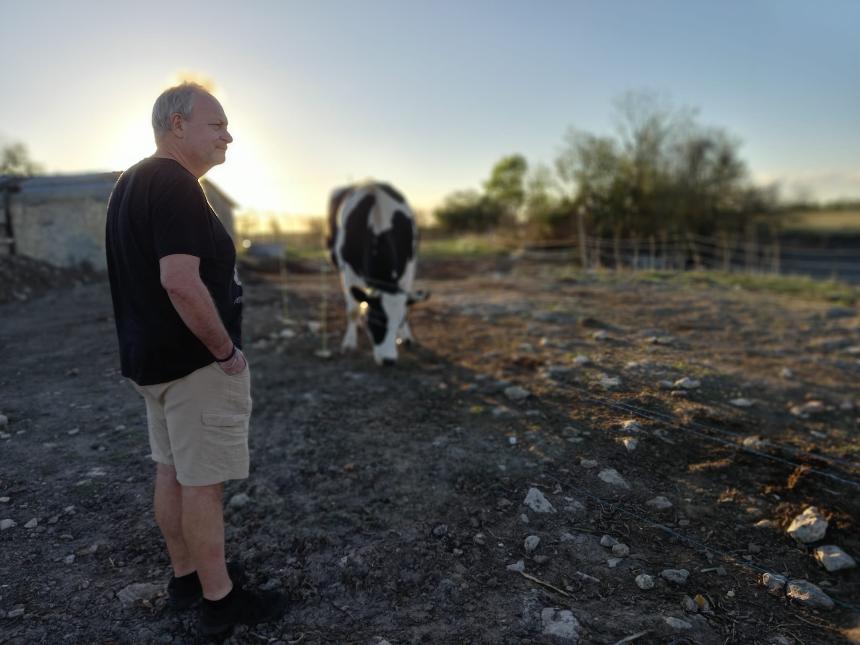
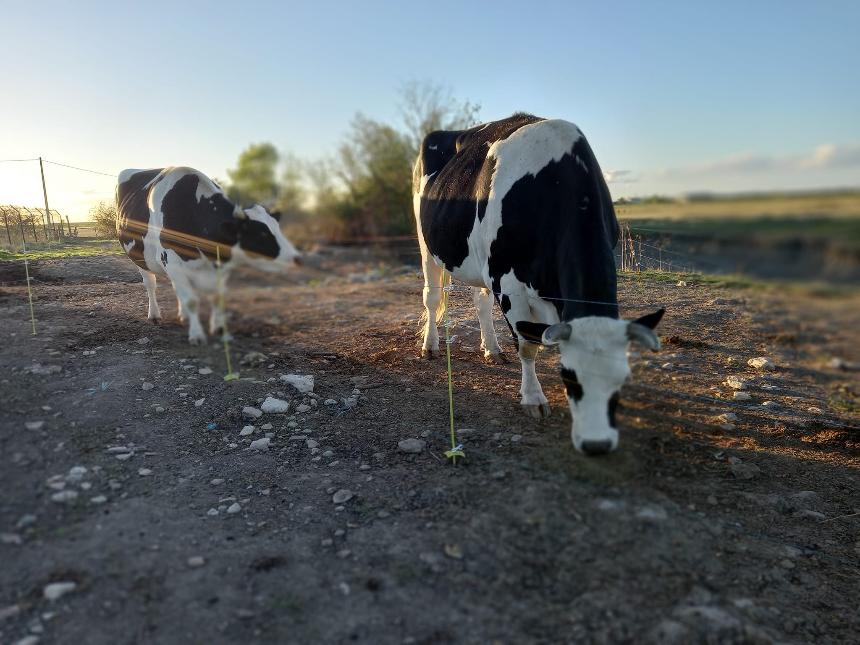
France 27 August 2022
World Day of the END of SPECIESISM
Today, it's world day for the End of Speciesism, the discrimination on the basis of species. One of the best books I have read and that describes this phenomenon without really mentioning it is this one: Some we love (pets), Some we hate (rats), Some we eat (pigs)..... from Hal Herzog, a professor in psychology one of the world's leading anthrozoologists. https://g.co/kgs/fG9vuU
The way we look at animals is cultural, depends on the way you have been brought up, the fears that you have been given in your life for certain animals (by for example films like Jaws, The Birds etc....), copying screaming behavior from other kids at school (I remember my class mates screaming about fish in the water, so I started to scream as well about fish in the lake) ....
All species are sentient..... can feel pain, can feel happiness. It's been proven scientifically. Why do we treat them differently?
When I came to France we accidentally adopted some broiler chickens from the farm next door. When one of them became ill I was feeling a bit ashamed to have to go to the vet with my chicken. Fortunately my family encouraged and supported me and there we went to the vet with my chicken. It was the way I was brought up. You love cats and dogs and they deserve a visit to the vet when they fall ill. But a chicken is from another category of animals, they are production animals for meat or eggs.....
But when you get to know the chicken you discover so many things about their characters, about their language, about their behaviors, their way of reacting to you, and their beauty is phenomenal. They get attached to you the way a dog or a cat gets attached to you. They listen to their names, they follow you around. At a certain stage my mother asked me: "Do you love your chickens the way you love your cats and dogs?" I was too ashamed to answer, Yes. So I said, I love them differently. But of course this was not true.....
It is also then that you realize that you made a mistake in misjudging these animals and you realize how many other species you misjudged before! Sharks are not dangerous, snakes are not dangerous, boar are not dangerous, rats are not dangerous, spiders are not dangerous....as long as you respect them and don't hunt or harm them.
My anecdote obviously finishes with the fact that I have stopped eating chickens and later all other animals and their products, and also seafood and fish. By experience, living with chickens as a pet, by reading this wonderful book, which I recommend. It explains how irrational humans really are with regard to their relationships with and behavior towards all kinds of animals. And so by understanding where I went wrong in the past. So I adapted my behavior. It was also after this book that we started to write this website on which you'll find all sorts of information like our definition of speciesism, the implication for other animals, and what you can do about it.
The site is easy to read without any cruelty to animals. Just recently we got a compliment from a mother and her kid who did her school thesis about how you treat your cats and dogs, which of course was a very pleasant surprise to us.
Today I celebrate the end of discrimination of species. What still happens in the world is wrong. Today is a moment to stand still and to think about it and I hope others will realize this as well and change their behavior towards animals.
Happy END OF DISCRIMINATION OF SPECIES DAY to all of you and especially to those who fight daily for these animals, a fight that is difficult, that is long but there is light at the end of the tunnel. Our society is slowly changing because of you!
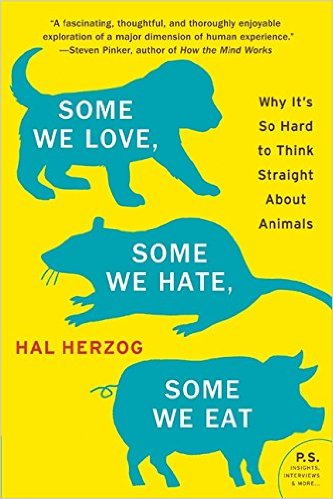
Frankrijk, 2 augustus 2022
Dus is het eigenlijk niet te verbazen, dat ik pas in de jaren 2000 vegetarisch en later veganistisch ben geworden. Het was mooi om te zien. Ik ben dus half op een boerderij grootgebracht. En ook ik dacht dat het allemaal maar overdreven was wat die "dierenactivisten" vonden, en tja ook ik wilde niet horen tot die "extremisten" die helemaal geen dierlijke produkten meer tot zich namen.
Maar heden ten dage, vandaag de dag, is het dus allemaal niet meer zo. Wat men je ook voorhoudt over dieren die goed worden verzorgd, waarvan wordt gehouden, het is allemaal niet waar, want uiteindelijk gaan de koeien gewoon na een jaar of 4 naar de slacht. En dan praat ik nog niet eens over de kippen, de varkens, de geiten die op elkaar leven in megastallen met dierenziektes en zoönosen tot gevolg.
Ben ik voorgelogen? Tja, eigenlijk wel een beetje. De reclames helpen daar nog een handje aan mee.
Ik ben blij de stap gezet te hebben te stoppen met het eten van dieren en hun produkten. Zoals het was is het niet meer. En het zal ook nooit meer zo worden. Het wordt me niet in dank afgenomen door een aantal mensen. Tant pis.
Ode aan een samenleving zonder wreedheid bij dieren
Oooit....(in de jaren 70') speelde ik iedere zomer op de boerderij van mijn grootvader in Friesland. "Pake" heette hij voor mij, zoals het de gewoonte is in de Friese taal je grootvader te noemen. Een uiterst lieve man. Samen met z'n tweede vrouw beheerde hij een melkveehouderij .... nou eigenlijk melkveehouderijtje zou je eerder kunnen zeggen. Met max 12 koeien, in ieder geval in mijn jonge jaren. Iedere koe had een naam. Ook had hij natuurlijk een Fries paard. En ik had mijn eigen pony. Ik heb er de mooiste herinneringen aan.
Toen ineens was het over. Hij ging met pensioen, de boerderij is verkocht aan een stel niet-boeren. Want tja, in de tussentijd was het niet meer "normaal" om "maar" 15 à 20 koeien te hebben. Je had er op z'n minst 50!
Die concurrentie heeft hij op zijn late leeftijd niet meer aangekund. Desalnietemin heeft hij daarna een goed pensioen gehad.
Waarom dit verhaal? We zitten inmiddels in het jaar 2022 en in sommige gevallen praten we nu al van 1000 koeien. Die extreem snelle explosie in 50 jaar is nu de oorzaak van de landbouwcrisis, (de boeren hebben er een stikstofcrisis van gemaakt, maar het probleem ligt veel breder dan ze willlen denken) en de boerenprotesten, want kunstmest, ruilverkaveling, concurrentie en overheidssteun hebben de boeren geholpen om uit te groeien tot megastallen, om "een echte AGRIbusiness" te worden met overschotten, melkplassen, boterbergen, mestoverschotten en vervuiling en emissies tot gevolg. Dit alles draait ze nu uiteindelijk de nek om....
Oooit....(in de jaren 70') speelde ik iedere zomer op de boerderij van mijn grootvader in Friesland. "Pake" heette hij voor mij, zoals het de gewoonte is in de Friese taal je grootvader te noemen. Een uiterst lieve man. Samen met z'n tweede vrouw beheerde hij een melkveehouderij .... nou eigenlijk melkveehouderijtje zou je eerder kunnen zeggen. Met max 12 koeien, in ieder geval in mijn jonge jaren. Iedere koe had een naam. Ook had hij natuurlijk een Fries paard. En ik had mijn eigen pony. Ik heb er de mooiste herinneringen aan.
Toen ineens was het over. Hij ging met pensioen, de boerderij is verkocht aan een stel niet-boeren. Want tja, in de tussentijd was het niet meer "normaal" om "maar" 15 à 20 koeien te hebben. Je had er op z'n minst 50!
Die concurrentie heeft hij op zijn late leeftijd niet meer aangekund. Desalnietemin heeft hij daarna een goed pensioen gehad.
Waarom dit verhaal? We zitten inmiddels in het jaar 2022 en in sommige gevallen praten we nu al van 1000 koeien. Die extreem snelle explosie in 50 jaar is nu de oorzaak van de landbouwcrisis, (de boeren hebben er een stikstofcrisis van gemaakt, maar het probleem ligt veel breder dan ze willlen denken) en de boerenprotesten, want kunstmest, ruilverkaveling, concurrentie en overheidssteun hebben de boeren geholpen om uit te groeien tot megastallen, om "een echte AGRIbusiness" te worden met overschotten, melkplassen, boterbergen, mestoverschotten en vervuiling en emissies tot gevolg. Dit alles draait ze nu uiteindelijk de nek om....
Maar de inkrimping van de veestapel moet gebeuren, of ze willen of niet en hopelijk houdt Minister-Président Mark Rutte, die moet ageren voor het algemeen belang!!!, voet bij stuk ... voor het milieu, voor de natuur, voor de planeet, voor de dieren en voor de mens.
Ik ben later nog in "mega" stallen geweest in Friesland waar alles was geautomatiseerd. Contact koe en boer werd minimaal. Ik heb het dus van héél dichtbij meegemaakt. Het melken, het kalven, het weghouden van de kalfjes van de moederkoe. Het verdwijnen van de stierkalfjes voor de slacht. Want natuurlijk mannetjes kalfjes gaven geen melk. De kippen hadden het redelijk goed in hun ren en de schapen en geiten zaten 's winters fijn op stal in grote hokken op stro. Ik ging zelfs nog met "Pake" op de wagen achter het Friese paard naar de weilanden waar de koeien stonden te grazen. Dit was allemaal voor de ruilverkaveling. Een tractor had hij volgens mij nog niet eens. De melkbussen stonden iedere ochtend en avond aan de kant van weg. Heel idillisch allemaal (behalve dan die arme kalfjes die werden weggehaald).
Ik ben later nog in "mega" stallen geweest in Friesland waar alles was geautomatiseerd. Contact koe en boer werd minimaal. Ik heb het dus van héél dichtbij meegemaakt. Het melken, het kalven, het weghouden van de kalfjes van de moederkoe. Het verdwijnen van de stierkalfjes voor de slacht. Want natuurlijk mannetjes kalfjes gaven geen melk. De kippen hadden het redelijk goed in hun ren en de schapen en geiten zaten 's winters fijn op stal in grote hokken op stro. Ik ging zelfs nog met "Pake" op de wagen achter het Friese paard naar de weilanden waar de koeien stonden te grazen. Dit was allemaal voor de ruilverkaveling. Een tractor had hij volgens mij nog niet eens. De melkbussen stonden iedere ochtend en avond aan de kant van weg. Heel idillisch allemaal (behalve dan die arme kalfjes die werden weggehaald).
Dus is het eigenlijk niet te verbazen, dat ik pas in de jaren 2000 vegetarisch en later veganistisch ben geworden. Het was mooi om te zien. Ik ben dus half op een boerderij grootgebracht. En ook ik dacht dat het allemaal maar overdreven was wat die "dierenactivisten" vonden, en tja ook ik wilde niet horen tot die "extremisten" die helemaal geen dierlijke produkten meer tot zich namen.
Maar heden ten dage, vandaag de dag, is het dus allemaal niet meer zo. Wat men je ook voorhoudt over dieren die goed worden verzorgd, waarvan wordt gehouden, het is allemaal niet waar, want uiteindelijk gaan de koeien gewoon na een jaar of 4 naar de slacht. En dan praat ik nog niet eens over de kippen, de varkens, de geiten die op elkaar leven in megastallen met dierenziektes en zoönosen tot gevolg.
Ben ik voorgelogen? Tja, eigenlijk wel een beetje. De reclames helpen daar nog een handje aan mee.
Ik ben blij de stap gezet te hebben te stoppen met het eten van dieren en hun produkten. Zoals het was is het niet meer. En het zal ook nooit meer zo worden. Het wordt me niet in dank afgenomen door een aantal mensen. Tant pis.
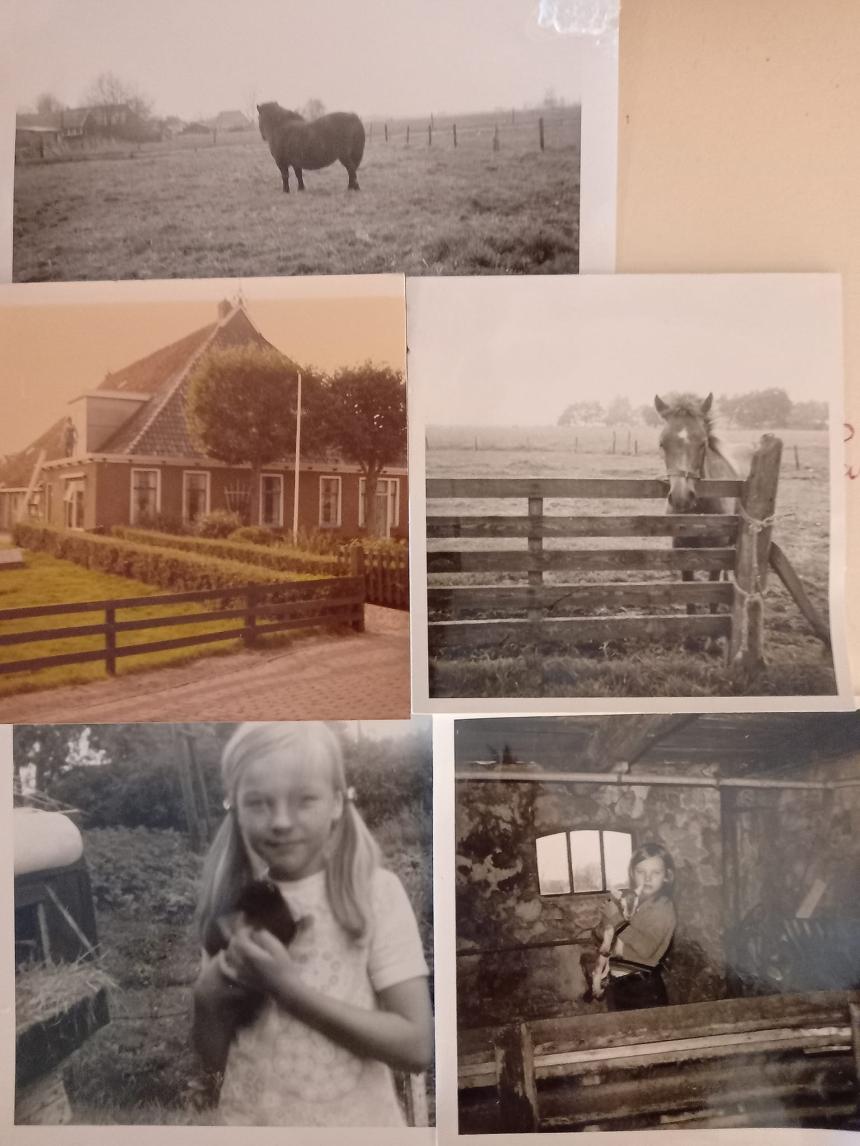
France, 13 July 2022
"We're not from another planet. We are from the future."
"We are our own story" says Jonathan Safran Foer in his book "Eating Animals", that I bought many years ago. At that stage I was a vegetarian, almost vegan, ate some fish from time to time. It was this book that convinced me to become vegan completely and it was also this book that made me realize that only changing my diet was not enough! I had to get out into the open.
Of course I could eat only at home, without letting anyone know that I was a vegan. I would be trapped which is of course not a good thing to do. And it would also mean that IF I would go out for a meal in a restaurant, or at a party, I would either have to eat nothing, or give in and eat animals, which would be completely against my convictions. You can not hide it. Eating together is a social thing!! And above all what would my decision on not eating any animal products mean to all the other animals people still eat, to (factory) farming?
Jonathan Safran Foer says it so justly in his last chapter "Storytelling": "Choosing leaf or flesh, factory farm or family farm, does not in itself change the world, but teaching ourselves, our children, our local communities and our nation to choose conscience over ease. One of the greatest opportunities to live our values - or betray them - lies in the food we put on our plates. And we will live or betray our values not only as individuals, but as nations. "
So that is what we have decided to do. To spread the word. With our "Vegan tour de France" https://anti-speciesism.com/Our-Vegan-Tour-de-France.php also on facebook https://www.facebook.com/vegantourdefrance , with my constant messaging here on facebook about animal farming and everything that it ruins, with our messages to the national and even local authorities (* see an example below which will show that it's still not easy to be frank about being a vegan and all it entails..... )
We think we have a very good reason to do what we do and to continue what we do. And you'll find out why, when you read this book which I really recommend. When you open up to the suffering, to the waste of animal lives, to the pollution, to the destruction of our planet you will be ready to absorb what Foer has written. If you're not you'll put it aside, as a family member of mine has done when I lent her this book. Everyone is their own story.....
According to Foer: "The factory farm will come to an end because of its absurd economics someday. It is radically unsustainable. The earth will eventually shake off factory farming like a dog shakes off fleas..... ".
It's just a matter of time. As we always say: "We're not from another planet. We are from the future." 
Our message to the local maire after we went to the opening of a new building for associations. She did not respond.
*How to recognize a vegan? No need to, they will tell you. It's a joke and a cliché with some element of truth depending on the circumstances.
Today had the potential for such a circumstance. It was a pleasure to attend the inauguration of the new building and to hear the speeches. Unfortunately the friendship drink was a disappointment. It seemed to us that there was nothing for vegans.
We did not want to spoil the atmosphere and therefore did not draw your attention to this point. If we had been there without eating, we would invariably have had to explain to people why we weren't eating. So, not to reinforce the joke/cliché, we left. To be frank, we are surprised and disappointed that today, when the benefits of a vegan diet for the climate, the environment, the biodiversity and the health of people are well known, you have not taken it into account.
Frankrijk, 10 juli 2022
Van architect naar natuur/klimaatactivist.....
Wat gebeurt er als je in een hittegolf terecht komt en je beter in huis kan blijven en dus de zolder eens flink gaat aanpakken.....?
Je vind foto's en je vind oude dictaten van de technische universiteit Delft afdeling Bouwkunde. En dan open je een dictaat "inleiding landschapskunde", gek genoeg één van de weinigen die ik heb gehouden. Waarschijnlijk toch al wel omdat het me altijd heeft geïnteresseerd.
Je slaat het dictaat open. Ik kan me nog goed herinneren waar ik dit vak uit m'n hoofd heb moeten leren: op een handdoek op het strand in Scheveningen....
Even voor de goede orde. Dit was in het studiejaar 1979/1980!!!!
En in het allereerste hoofdstuk komt gelijk al het probleem van de landbouw aan de orde. En dan in het bijzonder de relatie landbouw en milieu. Zelfs het fenomeen klimaatverandering wordt aangekaart. En natuurlijk komt ook de relatie bouw en milieu naar voren. En dat zijn nu juist dé sectoren die nu in Nederland in de schijnwerpers staan in het stikstofdebat.
Ik deel hier graag een gedeelte van dit hoofdstuk. Het geeft goed de problematiek weer en gek genoeg is die eigenlijk nog steeds het zelfde! Het is zelfs veel erger geworden. Want zoals ik in het begin al zei, we zitten in een klimaatcrisis met regelmatig hittegolven, maar we zitten ook in een landbouwcrisis en een (woning) bouwcrisis die daar, dus aan de klimaatcrisis beiden direct aan bijdragen!
Ik heb de highlights aangegeven met een dikke rode pijl! Ik raad jullie echt aan deze stukken te lezen. We zitten, nu 40 jaar later , nog steeds in dezelfde penarie! En waarom is dat nog steeds niet veranderd?
Tja en dan vraag ik me natuurijk zelf ook af, waarom heb ik er niet zelf eerder wat aan gedaan. In 40 jaar gebeurt er veel. Je bent jong, je zoekt, je leeft je leven, je ontmoet mensen en je leert van deze mensen, je werkt waar je werk kan vinden (ministerie VROM/Duurzaam bouwen en gemeente Delft), je wordt zelfstandig (eigen bureau), je verhuist naar een ander land, Frankrijk. En pas daar!!!! kom je heel direct in aanraking met de trieste waarheid van het "platteland". Allereerst voor de dieren, voor de natuur en later voor het klimaat. Je komt in aanraking met de natuur, de fauna, de flora en je ziet dat ook hier alles erop achteruit gaat. Je bent ouder, je ziet meer, je weet meer, en dan komt de klap! Je kan er wat aan doen! Je word vegan! Want daarmee sla je meerdere vliegen in één klap (dit is figuurlijk natuurlijk). En je kan anderen er proberen van te overtuigen hetzelfde te doen.
Er moet iets veranderen, want niet alleen de natuur (volgens de nieuwste gegevens gaat ook het aantal vlinders, naast bijen, er drastisch op achteruit ook door de opwarming van de aarde) maar ook wij zullen het nog hard te verduren krijgen.
Ik kom van oorsprong uit een boerenfamilie uit Friesland, dus ik begrijp de weerstand, de wanhoop, de woede (al wijs ik ieder geweld dat daaruit voortkomt af) maar het probleem van de landbouw voor natuur, biodiversiteit, milieu en ook klimaat stamt af van vele jaren terug. Men had al héél lang kunnen weten dat men de verkeerde kant opging en dat er op deze manier op den duur in de veeteelt geen toekomst meer zou kunnen zijn.
Mijn advies aan de boeren: pas je aan, zoals andere bevolkingsgroepen zich ook hebben moeten aanpassen aan veranderende maatschappelijke omstandigheden. Toen ik afstudeerde was er weinig vraag naar architecten dus ben ik de bestuurskant opgegaan.
Mijn advies voor de consument: wordt vegan! Je voelt je niet alleen veel beter, lichamelijk maar ook psychisch want je draagt niet meer bij aan dierenleed maar ook je bijdrage aan vervuiling/CO2 uitstoot gaat er drastisch op achteruit. Om jouw eigen bijdrage te kunnen meten als je vegan zou worden (ten opzichte van een dieet met vlees) bestaat er een instrument 'The global calculator". Op deze site hebben we uitgelegd hoe die werkt. https://anti-speciesism.com/Antispeciesisme-en...
Ga aan de slag! Het zal je verbazen want het verschil in CO2 uitstoot is enorm.
ps Foto van de presentatie van ons afstudeerprojekt, de uitbreiding van Schiphol Airport notabene. En laat ik nou een gloeiende hekel hebben aan het geven van presentaties .... 
Frankrijk, 24 juni 2022
Mijn reactie op de "stikstofcrisis"
France, 9 February 2022
What I am going to write below is going to shock people.
Imagine:
- you have a thousand or more human mothers in an establishment (read barn) for the production of their eggs in their overies;
- and you have some human males in the barn too to fertilise their eggs;
- they rape these human mothers;
- once the eggs are fertilised they are taken away from them and the embryos are put in a couveuse;
- once the human babies get bigger they are transported and put in a barn to be fattened up for consumption;
- imagine you can see lots of these little fragile creatures alone in crates, no mother around to protect them, to defend them; the farmer comes twice a day to pick up the dead babies who have been laying there suffering because it is not profitable to get a doctor to cure them when they get ill;
- and once they are big enough/heavy enough they are transported in crates to an abattoir, sometimes quite far away;
- in the abattoir they are hung up on their little legs, so that their little heads go through an electric waterbath where they are stunned and after which their little throats are being cut open.
They are cut into pieces to be put in little packets with cellophane on top.
Hay, this reminds me of a book I recently read.
Are you shocked? Well, that's the whole idea. You must know that this scenario happens everyday all over the world with chickens, with ducks, with turkey, with quail for their organs, for their flesh and for their feathers (and as a matter of fact also with mammals (cows, sheep, goat, etc)).
Chickens, poultry are the most mistreated, tortured species on earth.
On the photo you see thousands of small, vulnerable chicks, alone, without a mother to protect them, coping against the brutal ways of factory farming. Hatched in an incubator, they are thrown on conveyor belts , transported in boxes without food or water to big barns. More than 2,5 percent dies even before arriving in this farm. The survivors are thrown into the barn. They huddle up together in a corner when a man or a woman comes in. This is the only way they can protect themselves. There are no hiding places, everything is open and bare.
Twice a day the farmer picks up the dead little bodies. etc.... the rest you know from what I wrote before about the human babies.
Did you know that chicks are already more intelligent at the age of 3 days than a human baby (a chick can count up to 5 already soon after it hatches)?
I once heard a farmer say that chickens are dumb as they have very little brains in their heads. The sad thing is that they have to say this, because how otherwise would they be able to justify what they are doing to these animals. What the whole chain is doing to these animals (vets, incubator companies, transporters, farmers, butchers, etc.... ) Here in France they call an animal "sujet" as if it is just a thing.
It is the "inconvenient truth" (read our article here https://anti-speciesism.com/animal-sentience---what-is-it... ) that also these animals are sentient beings and that people do whatever they like to these animals.
The most horrible thing is that now that people are changing their eating habits from beef, porc, to poultry they don't realise the enormous suffering they cause.
I am following the poultry market a bit: the number of poultry bred is going up worldwide. (The industry is suffering however because of the avian flu pandemics.)
Why do you do this to these animals? Why do you still eat these babies? Or their eggs? Why can't you change? Are you so weak that you can't even stay STOP? No more? Knowing that we have replacements everywhere for meat, for eggs even?
Go vegan, not only for them, but also for your own health, for nature, for the planet.
Think of them as human babies.
Thank you!
France, 17 January
Some quotes about chickens and cold weather:
"Chickens are quite hardy and can tolerate temperatures below freezing, but they prefer a warmer climate. .... Although chickens can tolerate colder temperatures, it is still important to keep coops warm and dry throughout the winter to improve laying and prevent disease." https://khpet.com/.../what-temperature-is-too-cold-for....
"Generally well cared for chickens easily handle temperatures down to zero or a few degrees below." https://www.scoopfromthecoop.com/tag/extreme-cold-care/
Look for chickens and low temperatures and you'll find more.
Two things are important in these quotes: if your chicken or coquerel is in a very good state of health he "can resist" lower temperatures. However its preference are warmer temperatures. To be able to resist a colder climate in general the chicken needs to have an area, a house where they can hide and be kept warmer.
I share this photo with a text from the book https://livre.fnac.com/mp13731197/Living-with-Chickens
to explain that the many breeds of chickens that we have now are descendants of the red and grey jungle fowl ( https://kidadl.com/animal-facts/jungle-fowl-facts and https://en.wikipedia.org/wiki/Grey_junglefowl ) They still exist and live in the sub tropical area's of India, Malaysia, Indonesia. Countries with a sub tropical climate in general with in some areas a decrease in temperature up to 0 °C but not more. These animals are reasonably resistant and strong. However us humans have created different types of breeds, smaller, larger, some without feathers over their whole body, others with no feathers on their necks etc..... Obviously inbreed has weakened these animals. So these animals need protection not only against predators but also against the cold and against extreme warmer temperatures too.
Chickens are not much different from cats, dogs, even humans. If they have the choice they go somewhere warm to be comfortable. I look at chickens as I look at our cats and our dogs. We have them for their company, because they are lovely pets to have around. I don't see our chickens as a production animal for her eggs and coquerels as a production animal for their sperm being able to make chicks...
So I treat them that way, as a companion animal.
Most other people (I know, not all) keep chickens the old-fashioned way for their eggs, in the corner of their garden in a fenced in area (in winter mainly muddy) with a house. That's OK but then look after them properly and provide them with the appropriate housing and care (vets if necessary).
A couple of days ago I shared some photos of a dead coquerel and I said it had died from the cold. I got some remarks about that. How do I know he died from the cold? Did I do an autopsie? Others said their chickens prefer to sleep in the tree even though they have a nice house at their disposal. I didn't have the time nor energy to respond to these questions. But here we go.
The dead coquerel that I photographed lived on a muddy patch with a number of chickens and a goose (as I could see because I don't like to look into other peoples gardens if not necessary). The chicken house was open all the time even during the night , and before I had seen a chicken sleeping on the house in stead of in the house, so they didn't have proper shelter against the cold. The food I saw were leftovers from the kitchen: carrot peels etc...
It was freezing minus 5 at the least. It was of the breed "cou-nu", so no feathers on his neck and a breed that is known for having 50% less feathers than other breeds. It is a common commercial meat breed here in France. The resistance to cold depends on the breed. Did he die of the cold or was he ill? Well, he definitely was not healthy because he died!!! So the cause could have been an underlaying disease/parasite, or the cold, or the breed. Or all of them together. Doesn't matter. I blame the owner for not looking after his chickens properly and the result is an animal that has been suffering and in the end died. Normally a chicken only shows at a very late stage when it's not feeling well. That's why so many poultry keepers think that their animals die of old age if they don't keep an eye on them. And that's normal when you put your chickens at the end of your garden where it is very easy to forget them especially in winter time when humans choose to be indoors most of the time. And when you know your chickens and care for them you see quite easily when they are ill or not.
Chickens are as a matter of fact birds. They like to sit as high as possible when they go to sleep. The heavier chickens can't fly (this is the humans fault) but still they will look for the highest perch. When you have several chickens you will see that the most dominant ones in the group will try and get the highest places. The smaller birds who can fly will very likely look for a tree to perch in for the night. Even if it has a house. Just because it feels safer there. Another reason why a chickens prefers trees and the outside over its house for the night could be because there are parasites (red mites) in the house which you can treat very well with Stronghold by the way, there could be rats in the house, it doesn't feel safe because of an earlier experience (fox, marten) or just because there are other chickens bullying it. It's about priorities and feeling safe is more important than feeling warm. I personally would never let my chickens sleep in a tree because of the danger of birds of prey as well.
Conclusion: I don't think it is fair of humans to happily say that their chickens are perfectly OK in the (extreme) cold whilst they themselves choose to sit in front of a fireplace nice and warm during cold weather. Go and get outside and sit still for a while in the cold and you know what I am talking about. If you can't have your chickens in a warm place for example in the house during the night, at least make a very good effort to provide them with as much as protection as possible against the cold, give good food to keep your animal healthy, deworm it, make sure it has no parasites (red mite is awful) etc.... Our chickens get extra cat food (as there are less insects, worms in winter) and I give them warm pasta plus of course their grains that they get daily. And defreeze their water SVP. It could have been that the coquerel died of dehydration too. Whenever I see our chickens are not well enough they come inside..... Previously we put a heating lamp or even a heater in our chicken house and you could see they really loved it. The photo is of our coquerel Hansje who chooses to sit on the radiator. We nurtured him back to life after his owner brought him to us after he was attacked by another coquerel. Afterwards he joined the others. People that claim that chickens are totally OK in cold weather see these animals as utility animals for eggs and for meat. They don't care much if their animal dies of the cold, because in the end it will be killed anyway. Once again, we don't see animals that way. Chickens are the most mistreated animals in the world. It is important to realize they are sentient and they need your protection.
If after this plea you still want to keep your chickens in the cold at least make sure their combs don't freeze by putting vaseline on their comb especially when they are large.
